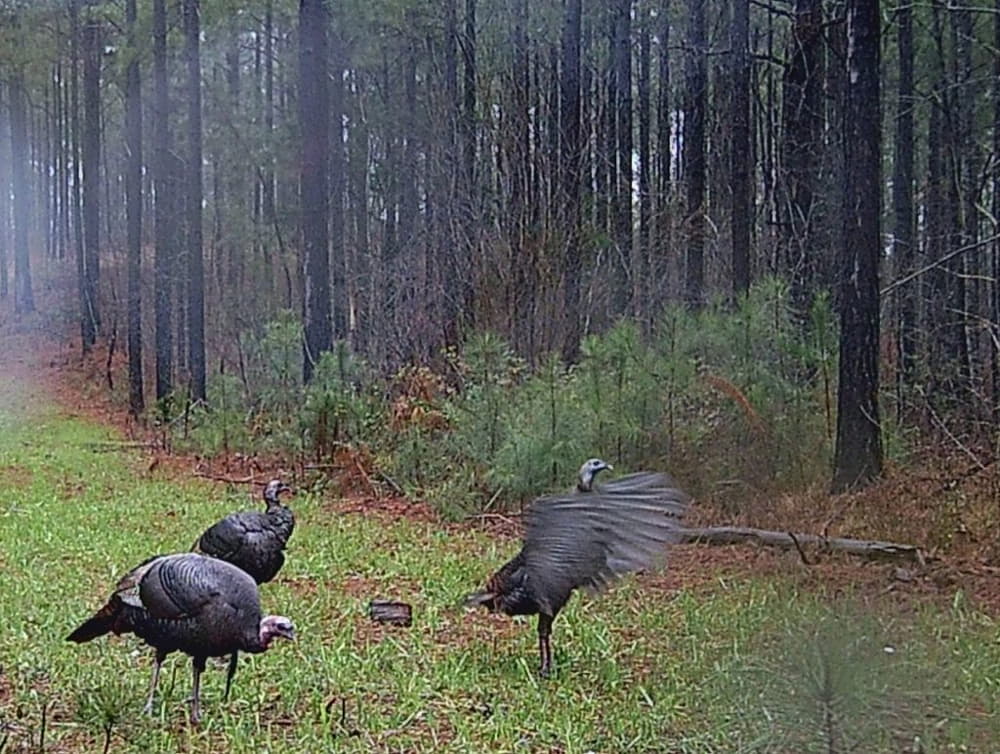Turkeys’ behavior in the rain is a topic of interest to many hunters. They often wonder: Do turkeys come out in the rain? Turkeys are large birds that are native to North America. They are able to adapt to many different environments, showing novel reactions when faced with rain.
Rainfall impacts turkeys in multifaceted ways, influencing their movement patterns, foraging behavior, and social dynamics. The main factor affected when it rains is their fur. Some studies suggest that turkeys may alter their activity levels during rain, seeking shelter or adjusting their foraging strategies to cope with wet conditions. Additionally, rainfall can affect turkey habitat and resource availability, further shaping their behavior.
Exploring the interaction between turkeys and rain helps us understand more about the behavior and habits of these animals. This knowledge will be of great help to you and other turkey hunters who want to increase the success rate of their hunts.
Table of Contents
Do Turkeys Come Out In The Rain?
Yes, turkeys can come out when it rains. Turkeys are highly mobile birds, capable of enduring various environmental conditions. They have feathers that are not completely waterproof like those of ducks or other waterfowl.
Turkeys’ water-resistant feathers are made up of a combination of down and contour feathers. Down feathers are silky and fluffy, and they provide insulation to help the turkey stay warm. Contour feathers are stiffer and more structured, offering protection as well as water repellency. These feathers help to keep the turkey’s body dry and warm.
When turkeys do come out in the rain, their behavior may change slightly. For example, instead of roaming around and foraging for food, they may seek shelter under trees or in barns. Turkeys will also huddle together to conserve body heat and stay warm. This adaptation allows turkeys to maintain their body temperature and minimize discomfort, ensuring their survival in wet conditions.

In addition, turkeys may eat more food than usual when it rains. This is because they need to generate more energy to stay warm and maintain their body temperature. This behavior is what makes turkey hunts in rainy weather more likely to be successful.
We have the answer to “Do turkeys move in the rain”, however they often do not like to go out when the rain is too heavy. Wet feathers can weigh down a turkey, making it difficult for it to fly or move. Wet feathers can also cause a turkey to become chilly and sick. When their feathers get wet, they lose this ability and can quickly become too cold or too hot. This is why turkeys will often seek shelter during rainstorms.
Why Do Turkeys Go Out When It Rains?
There are three prominent reasons why turkeys often go out when it rains: Looking for food, escaping predators and mating behavior.
Looking For Food
Turkeys are opportunistic foragers, constantly in search of food. Rainfall can stimulate insect activity, as well as soften the ground, making it easier for turkeys to access buried seeds and invertebrates. Thus, rather than seeking shelter, turkeys may take advantage of the increased food availability provided by rain. They actively foraging in fields, forests, or open areas.
Escaping Predators
In the wild, turkeys have many predators, including foxes, coyotes, and hawks. When faced with danger, turkeys may choose to brave the rain in order to escape from a predator. Their strong survival instinct and waterproof fur are the weapons that make their escape in the rain easier.
Mating Behavior
During breeding season, male turkeys (also known as toms) will often strut and display their feathers in the rain to attract females. This behavior is known as “fanning” and helps to show off their impressive plumage. Females will find males thanks to this technique and proceed to mate.
Tips For Turkey Hunting In The Rain
Hunting turkeys in the rain will always have unexpected challenges. Here are 6 tips to maximize success in wet conditions:
- Use camouflage clothing with rain protection: You should invest in high-quality camouflage gear designed to repel water. Gore-Tex or similar waterproof materials can keep you dry and comfortable during the hunt.
- Choose appropriate shelter: Seek natural or man-made shelters to stay dry while waiting for turkeys. You should look for areas with dense foliage or set up a portable blind to shield yourself from rain and maintain concealment.
- Employ decoys strategically: Place decoys in open areas where turkeys are likely to see them despite reduced visibility caused by rain. Brightly colored decoys can stand out against the gray backdrop of rainy weather.
- Adjust calling techniques: Rain can dampen sound, making it necessary to use louder and more pronounced turkey calls. You need to consider using a box call or slate call with a waterproof striker to produce louder, clearer calls that penetrate through the rain.
- Focus on cover: Turkeys often seek cover during rain showers to stay dry and avoid getting waterlogged. So you should target areas with dense cover such as thickets, edges of fields, or under tree canopies where turkeys may seek shelter.
- Stay scent-conscious: Wet conditions can amplify human scent, potentially alerting turkeys to your presence. You can use scent-control products and avoid unnecessary movement to minimize detection.

